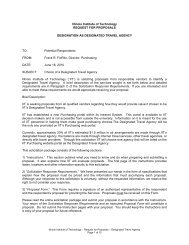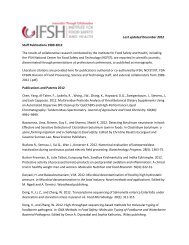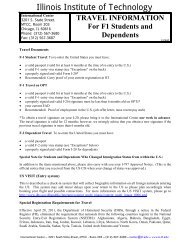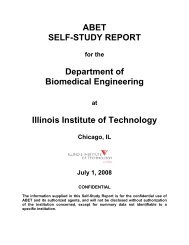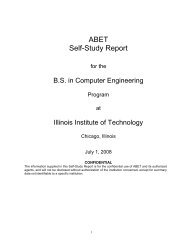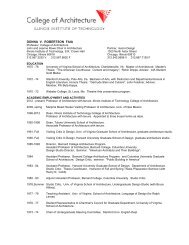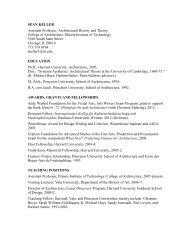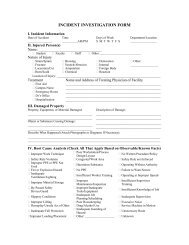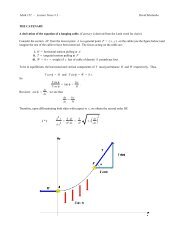Undergraduate Bulletin - Illinois Institute of Technology
Undergraduate Bulletin - Illinois Institute of Technology
Undergraduate Bulletin - Illinois Institute of Technology
Create successful ePaper yourself
Turn your PDF publications into a flip-book with our unique Google optimized e-Paper software.
Civil, Architectural, and Environmental Engineering<br />
Faculty<br />
Pr<strong>of</strong>essors<br />
D. Arditi, G. Fu, J. Mohammadi, D. Moschandreas,<br />
K. Noll, K. Pagilla<br />
Associate Pr<strong>of</strong>essors<br />
P. Anderson, J. Budiman, Z. Li, J. Shen<br />
Assistant Pr<strong>of</strong>essors<br />
L. Du, C. Menches, M. Modares, B. Stephens<br />
Senior Lecturers<br />
J. Novak, M. Snyder<br />
Faculty Emeritus<br />
J. Dygdon, S. Guralnick, J. Khisty, J. O’Leary<br />
Adjunct Pr<strong>of</strong>essors<br />
D. Carreira, A. Domel, S. Gill, J. Jahedi, R. Lemming,<br />
A. Longinow, A. Oskouie, L Rohter<br />
Adjunct Associate Pr<strong>of</strong>essor<br />
P. Sriraj<br />
Adjunct Assistant Pr<strong>of</strong>essor<br />
D. Grabowski<br />
Civil Engineering<br />
Department Website: www.iit.edu/engineering/cae<br />
The objective <strong>of</strong> the Civil Engineering program is to prepare<br />
graduates to enter and be successful in the civil engineering<br />
pr<strong>of</strong>ession. Graduates are expected to become<br />
licensed pr<strong>of</strong>essional engineers, and to reach responsible<br />
positions in a wide range <strong>of</strong> pr<strong>of</strong>essional settings, including<br />
consulting firms, industry, or government. As well, this<br />
program will prepare students to begin and successfully<br />
complete graduate studies in engineering and/or postbaccalaureate<br />
education in a pr<strong>of</strong>essional degree program.<br />
The Civil Engineering program provides breadth in core<br />
sub-disciplines and depth in at least one area <strong>of</strong> specialization.<br />
This degree program is accredited by the Engineering<br />
Accreditation Commission <strong>of</strong> the Accreditation Board for<br />
Engineering and <strong>Technology</strong> (ABET).<br />
Civil engineering is the original <strong>of</strong> the engineering disciplines.<br />
With the increase in population, the growing complexity<br />
<strong>of</strong> industries, and changing urban centers, the civil<br />
engineer’s task - applying science to the control and utilization<br />
<strong>of</strong> the environment for the total benefit <strong>of</strong> mankind<br />
- represents a challenge unsurpassed in all <strong>of</strong> engineering.<br />
The civil engineer <strong>of</strong>ten is confronted with conditions so<br />
variable and complex that they cannot be precisely defined<br />
by science and mathematics. Therefore, a knowledge <strong>of</strong> the<br />
arts and social sciences, as well as the physical sciences,<br />
is essential. In addition, because civil engineering requires<br />
overall planning <strong>of</strong> very large projects whose components<br />
involve many other disciplines, it is also necessary to have<br />
knowledge <strong>of</strong> management techniques. The goal <strong>of</strong> the<br />
Civil Engineering program is to provide an education that<br />
enables graduates to make far-reaching decisions that draw<br />
not only from technical knowledge but also from integrity<br />
and judgment.<br />
In the pr<strong>of</strong>essional courses, classroom lectures are supplemented<br />
by laboratory practice, including the study <strong>of</strong><br />
materials, structural engineering, hydraulics, environmental<br />
engineering, geotechnical engineering, and surveying.<br />
The principal functional areas that are considered subdivisions<br />
<strong>of</strong> civil engineering are structural engineering,<br />
transportation engineering, geotechnical engineering, environmental<br />
engineering, water resources engineering, and<br />
construction management.<br />
Students may choose a pr<strong>of</strong>essional specialization as described<br />
on the following pages, or one <strong>of</strong> the following<br />
minors: Air Force Aerospace Studies, Military Science,<br />
Naval Science, and other approved minors (see pages 162–<br />
165).<br />
Architecture students who plan to pursue a Master’s degree<br />
in Structural Engineering should take the following<br />
courses:<br />
CAE 303 Structural Design I<br />
CAE 304 Structural Analysis I<br />
CAE 307 Structural Design II<br />
CAE 310 Structural Analysis II<br />
CAE 431 Steel Design<br />
CAE 432 Concrete and Foundation Design<br />
Students should consult the IIT <strong>Bulletin</strong>:<br />
Programs for additional details.<br />
Graduate<br />
All civil engineering students are required to take the Fundamentals<br />
<strong>of</strong> Engineering (FE) examination during their<br />
senior year. The examination is <strong>of</strong>fered by the State <strong>of</strong><br />
<strong>Illinois</strong> in October and April. Students should contact the<br />
Department <strong>of</strong> Civil, Architectural, and Environmental<br />
Engineering for information concerning this examination.<br />
78



